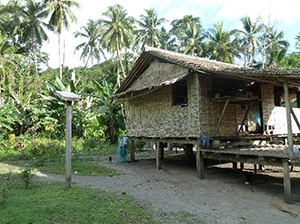The Opportunity to Get it Right - Solar Powering the Solomon Islands
What if we could go back and leapfrog the industrial era? Go straight from hunter-gatherers, agrarian, pre-industrial societies to green, sustainable, organic, technologically savvy, medically advanced and civilized, an interconnected, socially aware and just global village?
Imagine no possessions
I wonder if you can
No need for greed or hunger
A brotherhood of man
Imagine all the people
Sharing all the worldJohn Lennon – Beatles
No green-house gases, no plagues, wars, hunger, environmental degradation, social unrest and injustice? The funny answer to this incredible proposition is that in the poorest, most undeveloped and marginalized countries of the world… this opportunity exists.
The advance of solar power in these countries is a good example of how it is happening.
And it is happening – with hiccups and challenges – in little, forgotten, gob-smackingly beautiful, pristine, wild places like the Solomon Islands in the Pacific.
Here you will find thatched huts with solar power. Native people fishing by hand – with a mobile phone and GPS. Generators running on biofuel grown locally. Self-sufficiency is not a new trend, it’s an ancient tradition. Organic what? It’s always been organic. Wild harvest? That’s not exotic here. Everything is wildly growing in abundance or caught fresh from sea and shore.
In a world of industrialism, capitalism and materialism, systems, processes and multi-national corporations, places exist where our ways and our world are a very, very remote and strange concept. But they are faltering… and just like “No Man is an Island” no island is separate from the influence of the juggernaut of human development.
No man is an island entire of itself; every man
is a piece of the continent, a part of the main;
if a clod be washed away by the sea, Europe
is the less, as well as if a promontory were, as
well as any manner of thy friends or of thine
own were; any man's death diminishes me,
because I am involved in mankind.
And therefore never send to know for whom
the bell tolls; it tolls for thee.
For those for whom the bell tolls, (and isn’t that all of us?) there exist great threats and opportunities for our future. Could we, in remote places, have the opportunity to start afresh?
The Solomon Islands is 900 islands of tropical paradise, coconut palms and sandy beaches, lush forests – and bankrupt in 2004. Hopelessly under-developed or gloriously untouched? Civil strife added woes for the half million inhabitants in the mid-1990s.
“Over 6,000 militiamen have been arrested, over 9,000 charges have been laid, and more than 3,000 guns have been confiscated,” 2008 report on the Regional Assistance Mission to the Solomon Islands (RAMSI)
Add to that mix global warming leading to rising sea levels, deforestation and the influences of the western world that bring both guns and disease. Malaria, tuberculosis and leprosy are major health issues. Paid employment is 10%.

Into this scenario came an agricultural economist with a conscience, who saw the misery of the slave-like conditions of the copra trade in tropical countries like the Solomons and decided to do something. It was a 10-year odyssey that resulted in the development of a small scale, Direct Micro Expelling (DME) virgin coconut oil press that suited village-based enterprises. It brought together the best of business and community development to assist with a practical approach – trade not aid.
Jump 20 years and there are hundreds of DME presses around the world extracting tons of value-added, fresh, fair, future-proofed coconut oil in green, clean, organic and sustainable family enterprises. Thanks to recent new understandings about the healthy role of fat in our diets and the popularity of coconut oil in developed countries, valuable cash is being pumped back into developing economies, countries and communities.
In 40 village-based DME enterprises in the Solomon Islands people of both genders work side by side. One shift can produce 60 litres of oil, much more than is needed for local domestic consumption. Using the DME press, the oil is produced from coconut to barrel in under an hour. It is of the highest quality and, exported through a local company, Kokonut Pacific Solomon Islands, can make the village $1000 Australian dollars a week.
This money has made an incredible difference to the local people over 10 years of operation. They use it to fund education, medicine, housing, clean water. Pumps, pipes and water tanks supply communal water stations through the villages. This is a place where kitchens are communal and running water is a shared facility, not something that is piped into your home. The extra currency also has seen a boom in solar power and technology.
The mobile phone’s adoption has been so enthusiastic that the government uses phone numbers to assist them in tracking tax returns. So if you’ve got a mobile – you have to pay tax! Mind you, if only 10% of the population is in paid employment that’s not a lot of taxable income!
| Country | Electricity cost per KWh in US$ |
|---|---|
| Solomon Islands | 88–99¢ |
| UK | 20¢ |
| USA | 8-17¢ |
| Australia | 30¢ |
Solar power is a particularly good example of how these countries can adopt the best of the modern world and reject the worst. “Energy poverty” is widespread in the Pacific Islands. It’s estimated that up to 70% of households don’t have power. But traditional “electricity grids” don’t suit Pacific Islands. I mean, lets grid-connect 900 islands… who counts them all, just for starters?
Currently, the Solomon Islands rely on diesel generators to provide electricity. In the capital, Honiara, which accounts for 90% of the country’s power consumption, 64% of homes have unreliable and expensive power produced by expensive generators.
Outside Honiara, in the rural areas – where 90% of the population lives – only 6% have access to grid-connected electricity. The Solomons has the highest electricity costs in the Pacific. Those costs throttle the economic development of the whole country. In our country, there would be a meltdown if business and individuals had to pay the same as a Pacific Islander.
Geothermal and hydro-electricity generation are being investigated but are still several years away and again rely on huge levels of foreign investment and the “electricity grid” which is expensive and unsuitable.
Expensive power, costly infrastructure, foreign investment and an outdated delivery concepts around utilities, centralization, urbanization and grids are all trademark hobbles on the already stretched resources and economic development capacities of these often tiny, struggling, developing nations. And towards that, the World Bank announced last year a US $13million “financing” deal (low-interest debt) for the Solomon Islands Sustainable Energy Project to be injected into… wait for it… the national power utility – the Solomon Islands Electricity Authority (SIEA).
What’s needed is a completely different approach. An old fashioned solution with a modern twist. A leap-frogging of what we are now to what we could be… and like sunshine after a storm, individually funded and maintained, self-sufficient, small scale solar power has shone a light on what seemed like an intractable problem.
With coconut farmers and virgin coconut oil producers being paid reliably and regularly, proceeds from their DME enterprises are powering bright opportunities for small businesses like Sunpower Ltd run by Australian Mark Davies.
He first visited the Solomon’s in 2011 and was struck by the challenges in rural areas for access to good quality solar equipment which could provide people with reliable light and power. With an electronics background, combined with a desire to support initiatives which address education and community development, he started working with suppliers and manufacturers to produce a product specifically designed for the Solomon Islands.
“Understanding how your solar equipment works and how to look after it so that you achieve the best results is part of our service,” says Mark.
“We have a passion and commitment to providing a sustainable alternative to traditional energy sources through providing green energy solutions.”
 The future looks bright for solar power in the Solomon Islands, particularly in regard to the positive impact it can have in rural areas. Replacing kerosene lamps, candles and generators with a clean energy source and the ability to recharge communication devices such as phones, tablets and laptops is now very achievable at an affordable cost for households, businesses, schools and churches.
The future looks bright for solar power in the Solomon Islands, particularly in regard to the positive impact it can have in rural areas. Replacing kerosene lamps, candles and generators with a clean energy source and the ability to recharge communication devices such as phones, tablets and laptops is now very achievable at an affordable cost for households, businesses, schools and churches.
Evidence suggests that reliable access to energy at the household level can:
- Improve education outcomes by improving communication and access to education materials – allowing study in the night hours.
- Improve health outcomes by greater access to Internet and remote medical support – enable safe storage of pharmaceuticals.
- Improve social relationships through the provision of lighting for social event- Improve on security and safety through the use of lighting and alarms.
Sunpower stocks a large range of solar lighting sets. All sets contain a panel, battery, microprocessor/regulator and lights designed with reliability in mind. All lighting kits come with a 12-month warranty on the electronics as well as backup service. Lighting sets begin from $450 and the range includes a media set, which has an inbuilt speaker and FM Radio, a long-life system that makes use of a lithium battery as well as a range of Sunpower Lighting kits.
 Eddie Musuota heads up the Sunpower Team, which includes technical, sales and administrative staff. “Our product range is expanding all the time. As well as lighting sets we have larger packages, which include 250-Watt panels and 200 amp hour batteries. We have fridge/freezer solar packages arriving soon and we stock TV’s and DVD players, which can be connected directly to 12 Volt power.
Eddie Musuota heads up the Sunpower Team, which includes technical, sales and administrative staff. “Our product range is expanding all the time. As well as lighting sets we have larger packages, which include 250-Watt panels and 200 amp hour batteries. We have fridge/freezer solar packages arriving soon and we stock TV’s and DVD players, which can be connected directly to 12 Volt power.
Small socially-minded enterprises like Sunpower and Kokonut Pacific Solomon Islands (KPSI) are leading the way – eschewing the big business model and going for consistent, practical, small-is-beautiful solutions. They are having a significant, long-term, and better still, sustainable impact.
KPSI’s Australian counterpart, Kokonut Pacific, has invested all its profits into a charity, the Niulife Foundation. One of its first projects is to build a Coconut Technology Centre (CTC) in Honiara. Opening in 2015 this will become a significant training, research and development facility. Here there will be solar power, a Gassifer and alternative technologies aplenty to commercialise the bounty of the coconut palm into viable revenue streams on a small enterprise basis. Using permaculture, organic farming practices and vision, the CTC will unlock modern advances in science, technology and agriculture to fast track development in developing countries, always with an eye on sustainability and cultural suitability.
Could it be that, by using the best of our knowledge, resources and skills, we could, in fact, save, maintain and preserve the amazing wild, diverse and culturally rich places like the Solomon Islands? Could we avoid the pitfalls? Only time will tell, but there are some very encouraging possibilities.



Be a part of their story
#ihaveanewlife #realvillagepeople